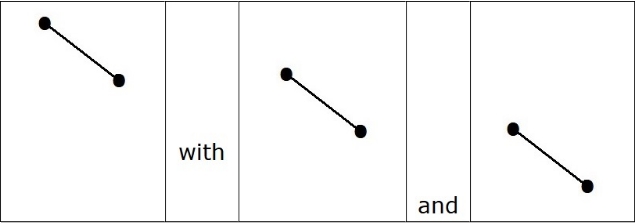Combining the longer blocks: [ ] [ ] [ ]
Exercises
Make beat #2 lower than beat #1

In this exercise on two-beat units, you're going to practice making the second beat lower in pitch than the first beat. You're going to practice this using a person's first and last name (which is a two-beat unit).
Read the names below. Make the stressed syllable in the person's last name lower in pitch than the stressed syllable in the first name.
[Lucy Cooper] [Rachael Smith] [Daniel Pitt] [Ron Hardie] [Kate Wild] [Elizabeth Potter] [Louis Harrison] [Laura Wedgeworth] [George Davidson] [Orin Hargraves] [Annie Williams] [Thomas Callan] [Kerry Ferguson] [Charles Owen] [Jane Bradbury] [Roger Berry] [Simon Clarke] [Lisa Sutherland] [Richard Francis] [Lori Capel] [Janet Phillips] [Lorna Knight] [Elizabeth Manning] [Tony Sanchez]
Make the units themselves descend in pitch

I've divided these individuals into teams of three. Read out the names of the players on each team. Make each person's name lower in pitch than the previous person's name.
You achieve this pitch control by focusing on the pitch level of the first names, not the last names. "Sing" the first names so that you can hear the pitch clearly.
Team one:
[Lucy Cooper] [Rachael Smith] [Daniel Pitt].
If you find this difficult, start with only the first names:
<Lucy> <Rachael> <Daniel>.
Say "Lucy" high in your pitch range.
Team two:
[Ron Hardie] [Kate Wild] [Elizabeth Potter].
Team three:
[Louis Harrison] [Laura Wedgeworth] [George Davidson].
Team four:
[Orin Hargraves] [Annie Williams] [Thomas Callan].
Team five:
[Kerry Ferguson] [Charles Owen] [Jane Bradbury].
Team six:
[Roger Berry] [Simon Clarke] [Lisa Sutherland].
Team seven:
[Richard Francis] [Lori Capel] [Janet Phillips].
Team eight:
[Lorna Knight] [Elizabeth Manning] [Tony Sanchez].
When units descend in pitch like this, it creates a sense that the units are related. Here it creates the sense that the three individuals are on the same team.
Add lower, unstressed words between the units

The added words should be low and level in pitch.
We are now using the same pattern that Steve Jobs was using.
Team one:
[Lucy Cooper] with [Rachael Smith] and [Daniel Pitt].
Team two:
[Ron Hardie] with [Kate Wild] and [Elizabeth Potter].
Team three:
[Louis Harrison] with [Laura Wedgeworth] and [George Davidson].
Team four:
[Orin Hargraves] with [Annie Williams] and [Thomas Callan].
Team five:
[Kerry Ferguson] with [Charles Owen] and [Jane Bradbury].
Team six:
[Roger Berry] with [Simon Clarke] and [Lisa Sutherland].
Team seven:
[Richard Francis] with [Lori Capel] and [Janet Phillips].
Team eight:
[Lorna Knight] with [Elizabeth Manning] and [Tony Sanchez].
Now some actual sentences!
[Lucy Cooper] and [Daniel Pitt] hired [Rachael Smith].
[Ron Hardie] listened to [Kate Wild] interviewing [Elizabeth Potter].
[Louis Harrison] was hired by [Laura Wedgeworth] and [George Davidson].
[Orin Hargraves] and [Annie Williams] are training [Thomas Callan].
[Kerry Ferguson] thinks that [Charles Owen] should promote [Jane Bradbury].
The reverend [Roger Berry] married [Simon Clarke] and [Lisa Sutherland].
[Richard Francis] and [Lori Capel] teamed up with [Janet Phillips].
[Lorna Knight] is speaking to [Elizabeth Manning] about [Tony Sanchez].
Now let's use some two-beat units that aren't names
So far, to get the pitch levels just right, we've been focusing on the pitch level of each person's first (given) name. From now on, focus on the pitch level of the first word inside the bracket (i.e., focus on beat #1), whether or not it's a name.
For example, in the next example sentence, the first words inside the brackets are
[Lucy...] [close...] [Boston...].
[Lucy Cooper] and a [close friend] ran the [Boston Marathon].
[Dozen's of competitors] from the [city of Toronto] ran the [Boston Marathon].
[Ron Hardie] learned that the [local hospital] was having [trouble hiring].
The [team of managers] learned that the [local pool] needed [more life guards].
[Louis Harrison] thanked the [entire committee] for its [thorough report].
The [athletes affected] thanked the [entire committee] for its [thorough report].
[Orin Hargraves] and [two others] are taking [early retirement].
The [Montreal Canadiens] and the [Toronto Maple Leafs] are playing at [7pm].
[Kerry Ferguson] thinks that our [new mayor] went to her [junior high school].
I'm [almost sure] that our [new mayor] went to my [junior high school].
The reverend [Roger Berry] had to [preach the sermon] with [no microphone].
[Because of the power outage], he [preached the sermon] with [no microphone].
[Richard Francis] was an [old man] when he [first saw London].
The [former boxer] was an [old man] when he [first saw London].
[Lorna Knight] is collecting [vintage coins] for her [granddaughter, Julie].
A [few friends] are collecting [vintage coins] for my [granddaughter, Julie].
Be as clear as Steve Jobs
Practice the same sentences that Steve Jobs used in his speech:
Sentence 1
When [I was young], there was an [amazing publication] called the [Whole Earth Catalog].
Sentence 2
So you [have to trust] that the [dots will somehow] [connect in your future].
When you can say these sentences smoothly, compare your intonation with that of Jobs by playing the audio clips below.
Sentence 1
Sentence 2
Intonation course pre-sale offer
This is a new course currently in development. Purchase it ahead of the launch date and get 50% off.
Full price: $75 USD
Early bird price: $37.50 USD
© 2024 Jobspeak Training
Privacy policy | Terms of use